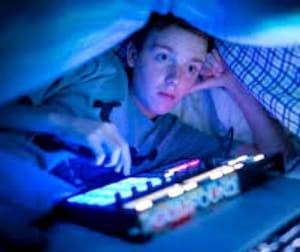
The pineal gland deserves credit for making people sleepy at night. By producing melatonin, which normally begins after sunset, the pineal gland alerts the body that it is time to sleep. The absence of light—especially blue light—triggers the pineal gland. Unfortunately for modern humans, blue light comes from television and computer screens, among other devices. This disrupts the pineal gland’s melatonin production and makes it harder to fall asleep.
A recent Swiss study gathered self-reported data about sleepiness and alertness from boys aged 15 to 17. For two weeks at home, the boys wore either clear glasses or glasses fitted with blue light-blocking filters in the hours before bed. The researchers repeated the same experiment in the lab, measuring the boy’s melatonin levels and reaction times. They found that filtering blue light before bed made the boys fall asleep faster.
A study conducted in Norway surveyed 10,000 adolescents aged 16 to 19. In this study, the researchers evaluated how gadget use before bed affected sleep latency (the time it takes to fall asleep) and sleep duration. Using screens before bed correlated to higher sleep latency and less sleep during the night.
A study published this month in the journal Lighting Research and Technology analyzed how blue light affected the sleep habits of 20 teenagers aged 15 to 17. On the first night of the experiment, participants wore orange glasses, which filter out blue light, before bed. The participants provided saliva samples each hour before bedtime. On the second night, the participants went through the same routine, but did not wear orange glasses. The study showed that when the teens did not filter blue light, their melatonin levels were 23 percent lower after an hour of screen time, compared to when they wore the glasses. Melatonin levels were 38 percent lower after two hours of un-filtered screen time.
These studies indicate that teens should establish gadget-free bedtime routines to get enough sleep at night. Parents can encourage teens to turn off their computer an hour before bed or leave their phone in another room at night.
This research was reported by The Economist.
Previous news in sleep:



 © 2025 Unyte Health US Inc.
© 2025 Unyte Health US Inc.